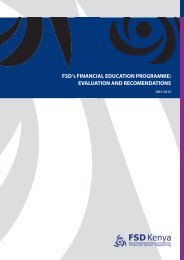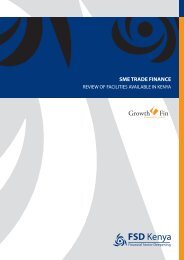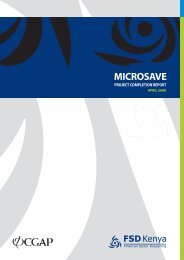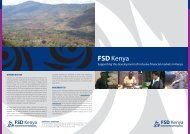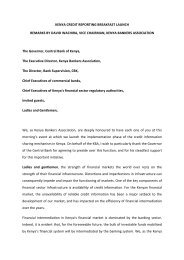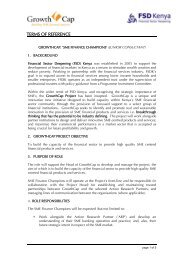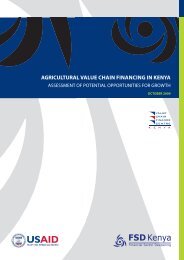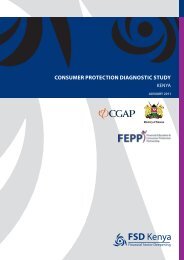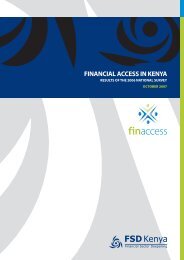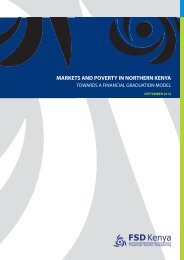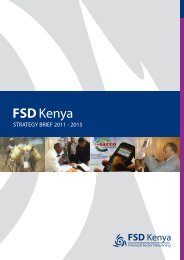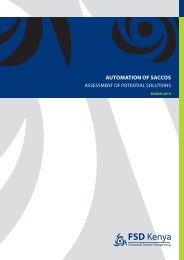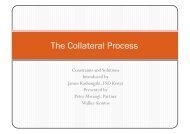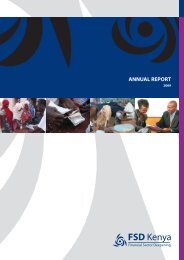FINAL REPORT - FSD Kenya
FINAL REPORT - FSD Kenya
FINAL REPORT - FSD Kenya
You also want an ePaper? Increase the reach of your titles
YUMPU automatically turns print PDFs into web optimized ePapers that Google loves.
What are some of the things<br />
that you spend money on in<br />
your household?<br />
How do you keep some<br />
money aside for future need?<br />
If you were to use certain<br />
institutions to send or receive<br />
money, which one would you<br />
prefer? Why?<br />
• Through passengers on buses<br />
• Respondents had never received money any where else other than<br />
through the DCO-VCO office. Usually they pick the money themselves<br />
and those who know how to write sign for it, where as others just use<br />
their thumb prints.<br />
• Food<br />
• Clothing<br />
• Medical bills<br />
• Fees for formal schools and Madarasas<br />
• In cases of excess can buy a goat for future selling.( form of savings)<br />
• All respondents dint have a bank account in any formal institution. They<br />
acknowledged that due to lack of money they could not save. The little<br />
they get they use it for immediate house hold needs. Due to absolute<br />
poverty they could not save. Howe ever some agreed that they lacked<br />
knowledge about the banking industry. They need some education then<br />
can start saving some little amounts. Most of the guardians are illiterate.<br />
Thus given an opportunity many were willing to learn and start saving.<br />
• Regularly receive money from relatives working in Nairobi. Ranges from<br />
Kshs 2000 and 3000. This is mainly for home up keep and paying school<br />
fees<br />
• OVC- DCO Office cause it’s near their homes, DCO takes the money<br />
to the recipients at their homes.<br />
• Hawilat: Can easily go there at just a phone call and receive your money<br />
ii. Focus Group Discussion with Potential OVC Beneficiaries at Bulla Iftin Learning Communities<br />
Point of discussion Discussion<br />
Economic activities • Retail trade, hawking, grocery, charcoal selling<br />
What are the difficulties you face<br />
in taking care of these children?<br />
• One of the major difficulties is sickness, mainly due to malnutrition,<br />
malaria and pneumonia. The high level; of mosquito presence and<br />
un-affordability of mosquito nets in the area has contributed to the<br />
prevalence of malaria. The current rains are the major cause<br />
pneumonia.<br />
• Lack of steady income due to un-employment. In the area there are<br />
no employment opportunities. There are no industries or people<br />
who would seek casual laborers i.e. to work on farms etc. main<br />
source of income are handouts from relief agencies and<br />
government. Most people wake up and wait for these handouts.<br />
There is a lot of dependence and redundancy. The little income<br />
there is generated from sale of goats and cattle plus small-scale<br />
business like selling cigarettes, miira and vegetables. A few<br />
individuals do these. On average they earn about Kshs2,000 per<br />
month<br />
• It’s hard to meet the scholastic materials needs, such as books,<br />
uniform, fees for secondary school students and other school levies.<br />
On average secondary education cost is about Kshs 5,000 per term,<br />
which is a burden to these low-income earners.<br />
• Being an urban area, respondents complained of difficulties in<br />
payment of monthly house rent. A month rent ranges from Kshs<br />
1,000 – Kshs 1,500 per room.<br />
• Due to the death of spouses many mothers’ roles have changed to<br />
22



